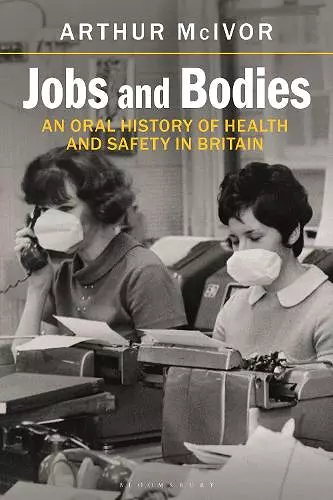Jobs and Bodies
An Oral History of Health and Safety in Britain
Format:Paperback
Publisher:Bloomsbury Publishing PLC
Published:30th Nov '23
Currently unavailable, and unfortunately no date known when it will be back

Written by a world experts on the history of occupational health, this work focuses on the history of public health and safety from World War I to the present.
In the early 21st century, radically changing work locations and patterns have jolted society to reflect more on the ways that employment affects the body and the mind. This book provides historical context and insights to aid our understanding of this contemporary crisis, critically examining the history of a neglected area.
In this oral-history based study, Arthur McIvor explores the history of health and safety from Second World War to the present, drawing extensively upon workers' own personal stories of occupational accidents, disasters, injury, disease, overwork and disability. It covers a wide range of workplace issues, from stories of TNT poisoning and overwork in wartime, through to the asbestos and black lung disasters, and the modern-day ‘epidemics’ of stress, burn-out and Covid-19.
Opening conversations surrounding the harms caused by work, this book analyses how people have lived with occupational illness and disability, critiquing risk and work-health cultures, and the structural violence characteristic of industrial capitalism and neoliberal economics, in addition to discussing the agency of big business and advocacy of workers and victims. Focusing on class, gender, disability and race, this book uses an impressive range of secondary and primary sources, including government reports and enquiries drawing upon workers’ testimonies, Mine and Factory Inspectors Reports, HSE papers, newspapers, Mass Observation responses and oral history interviews.
This is deeply moving and important account of how work is embodied; how the jobs British
people have done damaged them physically and mentally. McIvor is the leading scholar of
occupational illness and industry. His humanity and care for the subject is apparent on
every page.
McIvor takes us into the lived interior of the destructive history of structural violence at work. I appreciated how much care went into weaving these difficult stories together to create a national history from below and from within. It is a model of how to geographically scale-up our analysis without losing our grounding in people’s lives. It represents oral history at its humanistic best. * Steven High, Professor of History, Concordia University, Cana
ISBN: 9781350236219
Dimensions: 232mm x 156mm x 20mm
Weight: 440g
304 pages